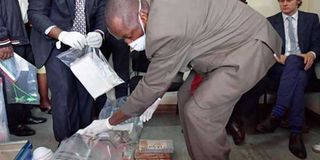How Kibaki officials bungled Sh6.4 billion cocaine case

Slabs of cocaine are presented as evidence at the Criminal Investigation Department headquarters, Nairobi on October 11, 2016. AFP PHOTO
What you need to know:
- Former Nacada chairman John Mututho says the drug lords are so entrenched in all the sectors responsible for fighting drug abuse.
- Former DPP Philip Murgor wrote to former police chief Major-General Hussein Ali protesting at the refusal by then director of CID Joseph Kamau’s men to hand over the file to then Attorney-General Amos Wako in order to facilitate the prosecution of the suspects in the Sh6.4 billion cocaine case.
- In another letter to the Secretary to the Cabinet and Head of Public Service Francis Muthaura dated October 12, 2005, Mr Murgor detailed how top government officials had interfered with the case with a view to protecting the narcotics kingpins.
Powerful forces in the Mwai Kibaki administration could have colluded with the police and the state law office to bungle the Sh6.4 billion cocaine case which was brought before the courts in 2005.
The details, contained in various correspondences between top government and security officials at the time, reveal the extent to which efforts to successfully prosecute the case were thwarted by elements within the police and the state law office.
The revelations, coming in the wake of the extradition of the Akasha brothers and their two accomplices – Pakistani national Ghulam Hussein and Indian Vijaygiri Goswami – to the US to face drug trafficking charges, help to shed light on the extent to which the narcotics kingpins have infiltrated the various arms of government from the executive, the security sector and the state law office with a view to shielding themselves from prosecution.
According to former National Authority for Campaign Against Alcohol and Drug Abuse (Nacada) chairman John Mututho, the drug lords are so entrenched in all the sectors responsible for fighting drug abuse, including the executive, the police, the military and the judiciary.
“For three years, we fought to be given a special police unit to fight drug abuse but it never happened. Instead, the Principal Secretary in the Ministry of Interior had Nacada offer Sh60 million, one third of Nacada’s total annual budget of Sh183 million, to conduct workshops,” he noted.
In one of the letters relating to the Sh6.4 billion cocaine case, then Director of Public Prosecutions (DPP) Philip Murgor wrote to police chief Major-General Hussein Ali protesting at the refusal by then director of Criminal Investigation Department Joseph Kamau’s men to hand over the file to then Attorney-General Amos Wako in order to facilitate the prosecution of the suspects in the Sh6.4 billion cocaine case.
“On December 29, 2004, the Attorney-General received and acceded to a request to provide a senior prosecutor to handle the case. The AG appointed (Senior State Counsel)Mr Oriri (Onyango), Assistant Deputy Public Prosecutor (ADPP), to take the plea and hearing date on the understanding that your investigation file was available for his scrutiny and directions, and further to enable the prosecuting counsel to prepare for the trial,” reads the letter dated January 6, 2005.
But instead of acting on Mr Murgor’s directions, the police investigators wrote back, seeking consent to have the case postponed for various reasons. They also suggested that the one tonne cocaine haul be destroyed for “security reasons”.
The letter attempts to justify the postponement of the case on grounds that new evidence had emerged and that more statements needed to be taken from potential witnesses.
“For security reasons, it is found risky to bring 1,141.5 kilogrammes of the seized cocaine before the trial court. The exhibits are held in safe custody at a security institution in Nairobi which, due to the same security reasons, requires security considerations before the court is taken to view the drugs,” the investigators wrote.
SEIZED DRUGS
The letter continued: “One day will not be sufficient to undertake the procedure. Under the circumstances, we are applying for the destruction of the seized drugs less the original samples and the analysed samples,” the DCI stated.
In another letter to the Secretary to the Cabinet and Head of Public Service Francis Muthaura dated October 12, 2005, Mr Murgor detailed how top government officials had interfered with the case with a view to protecting the narcotics kingpins.
He accused the police of using a prosecutor to secure consent to destroy the seized cocaine without the permission or knowledge of the AG and the DPP.
Brick wall
Having hit a brick wall, Mr Murgor explained how he reached out to then Internal Security assistant minister, the Mirugi Kariuki, asking him to escalate the matter to President Kibaki himself, only to be fired the same day for his alleged involvement in the matter.
“Later that evening, Hon Mirugi confirmed to me that after the meeting with him, he immediately proceeded to State House and reported the brief to Mr Stanley Murage, PS, State House. He stated that Mr Murage appeared upset, but was surprised that I had been, as a result, fired.”





